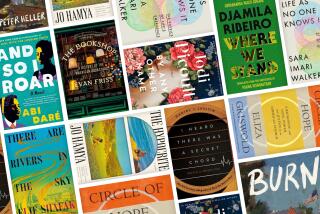Pages from a Rust Belt childhood
- Share via
Voracious readers often claim that reading saved their lives. It’s a statement rife with hyperbole. How can something that is essentially a leisure-time activity save a life? Yet in reading “An Open Book,” the quietly dazzling memoir by Michael Dirda, longtime columnist for the Washington Post Book World and winner of the Pulitzer Prize for criticism, we understand. To be sure, Dirda never makes such an exaggerated claim. Rather, he pairs the elements of a traditional memoir -- childhood remembrances depicting the path from naive understanding to a more mature perspective -- with the books that illuminated that path for him. His journey portrays not a life saved but one expanded, defined and enriched by books.
Dirda, a steelworker’s son, grew up in Ohio’s Rust Belt in the gritty working-class town of Lorain. Money is tight, his father distant and often difficult, and Dirda develops into a pudgy, introspective kid, inept at contact sports, isolated behind his thick-lensed spectacles. He isn’t a stellar student. In fact, his tendency toward reverie leads guidance counselors to suggest that he might be happier in a special institution for slow learners. (His parents don’t take up the suggestion.)
The happier world, for him, is the one he finds in books. Though neither parent is a reader, they have stocked the family bookcases as best they can for the edification of their four children. His mother warns Dirda and his sisters that for their school reports they must choose subjects that begin with the letter A, because the family owns only the first volumes of seven or eight encyclopedias and other reference works. (His mother bought these at special introductory prices, Dirda explains, before canceling the subsequent full-priced volumes.) “The Dirda family soon abounded with information on topics beginning with A: Alaska and Antarctica, artichokes, aardvarks and asteroids. Teachers were generally quite impressed with the breadth and depth of our apparent expertise.” This telling scene is a metaphor for much that transpires in the narrative as financial, educational and cultural limitations give way in the face of determined reading and an insatiable hunger for knowledge.
Dirda makes his way through the family’s reading stash, supplementing it with books he buys on trawling trips through local thrift stores or borrows from the library (sometimes using his mother’s library card to smuggle himself into the adult stacks, with their deliciously wider offerings). The world of the mind opens up to him.
He describes himself at age 11, at a family gathering one Christmas evening as his uncles play poker: “To be warm and safe on a cold night, enjoying delicious home-cooked food, while reading an enthralling book, with the noise of nickels and dimes plinking on the kitchen table and the soft susurration of mothers talking about their children in a gift-strewn, brightly decorated living room was to inhabit, for an hour or two, what Wordsworth called a ‘spot of time,’ a rare moment of complete and unalloyed happiness.”
In his school years, Dirda reads indiscriminately and widely: Joseph Conrad and Ayn Rand; Tarzan and Fu Manchu; Batman and Superman comics; Aristotle, Salinger, Thoreau, Plato and Kant. His eighth-grade English teacher -- “jaunty, dapper.... Imagine a young Fred Astaire” -- becomes a pivotal influence, sparking young Dirda’s appreciation of the works of Dickens, E.M. Forster, Shakespeare and E.B. White, as the class “would talk and talk away the sunshiny afternoon.” He finds in books the consolation many of us seek, the companionship and comfort often missing in life. He soon incurs a reputation for incisive thinking and earns a scholarship to Oberlin College, where his real education begins. After years of dazzling teachers less well read than he, Dirda is up against true scholars and is “exposed for the intellectual charlatan I knew myself to be.” Instead of giving up, bowing to the reality that other students have come from more intellectual environs and enjoyed grander opportunities than his, he makes up for the gaps in his education by the sweat of his blue-collar brow, with extra study, memorization and sheer tenacity. His memoir ends in his college years as he begins to understand that his ability to think, nurtured by years of reading, will take him far beyond his steelworking roots.
Ultimately, this is a love story, full of a passion for literature and marked by intellectual vigor. Celebrating the small-town joys of Lorain as well as the hardships and quiet satisfactions of his childhood, Dirda shows readers how books gave him a life greater than might have been expected. It’s a life-affirming trip for a man who often felt himself “on shaky ground” and who confesses that all he really knows how to do is read.
More to Read
Sign up for our Book Club newsletter
Get the latest news, events and more from the Los Angeles Times Book Club, and help us get L.A. reading and talking.
You may occasionally receive promotional content from the Los Angeles Times.







